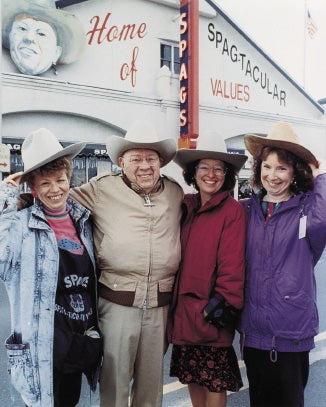How do you whittle 35 years of headlining business news down to a couple thousand words and a few pages? You don’t. But here, we take our best shot to highlight the companies, individuals, and moments that left a lasting impression.
Get Instant Access to This Article
Subscribe to Worcester Business Journal and get immediate access to all of our subscriber-only content and much more.
- Critical Central Massachusetts business news updated daily.
- Immediate access to all subscriber-only content on our website.
- Bi-weekly print or digital editions of our award-winning publication.
- Special bonus issues like the WBJ Book of Lists.
- Exclusive ticket prize draws for our in-person events.
Click here to purchase a paywall bypass link for this article.
How do you whittle 35 years of headlining business news down to a couple thousand words and a few pages? You don't. But here, we take our best shot to highlight the companies, individuals, and moments that left a lasting impression.
1989
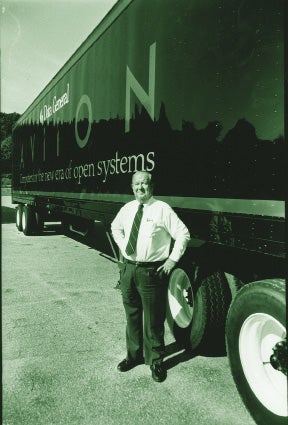
• Data General’s clarion call – While IBM’s dominance in the personal computer space decimated Data General’s foundational minicomputer business, the Westborough-based firm put a sharper focus on its server and processor business and spawned the AViiON series of scalable Unix systems. AViiON would lead to CLARiiON, a more successful, network-based system that kept the company afloat into the 1990s.
1990
• Norton Co. takeover, part 1 – More than 5 million shares of Norton stock were traded on the New York Stock Exchange on March 16 as British conglomerate BTR attempted a $1.64 billion hostile takeover of the Worcester-based industrial powerhouse.
• Federal Square – At the April groundbreaking for developer James Soffan's long-planned 24-story apartment complex (SkyMark Tower), U.S. Rep. Joseph D. Early (D-Worcester) announced plans for a $25 million to 30 million renovation of the nearby Federal Building.
• Norton Co. takeover, part 2 – Norton announced a merger on April 25 – with French manufacturer Saint Gobain. At $90 per share, the deal was valued at about $1.8 billion. A week earlier, Gov. Michael Dukakis had signed a law rushed through the Legislature meant to thwart the BTR takeover.
1991
• Biotech buildup – Germany-based BASF AG began construction on its 250,000-square-foot, $100-million research and manufacturing facility at Worcester’s Biotech Park. BASF announced it would initially employ 250 scientists and staff. Abbott Laboratories would acquire BASF’s pharmaceutical business, including its Worcester headquarters, in 2001 for $6.9 billion.
• WBJ Milestone: The Fact Book debuts
1992
• Developer’s World – Homart Development Corp. of Chicago bought the Natick Mall and Framingham’s Shoppers World with plans for major redevelopments at both shopping centers. Natick Mall reopened in 1994 after a $250 million update and Shoppers World followed in ‘95. Three years later, Homart’s parent company, Sears, sold both locations to General Growth Properties.
• March Madness – Still known as the Centrum, Worcester’s downtown arena hosted the first and second rounds of the NCAA men's basketball East regional, including a 77-71 University of Massachusetts upset of Syracuse, a seminal victory for the John Calipari-era Minutemen. The city won big, too: Officials estimated the six games made an economic impact of $3 million.
1993
• Wyman-Gordon’s headlining act – It was a busy year for the Grafton-based aerospace manufacturer. Three straight quarters of losses. Layoffs. Pollution accusations. A $600,000 safety-standard fine. And the big news? Wyman-Gordon acquired its largest competitor, Cameron Forged Products.
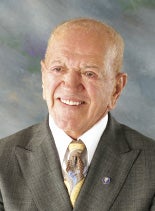
• Duddie’s big deal – In the wake of $3 million in losses over the last three years, Worcester rich guy Barry Krock decided to sell Commerce Bank & Trust Co. Fellow Worcester rich guy, auto dealer David “Duddie” Massad, bought nearly all shares of the company in November, with plans to expand the bank’s asset base to $1 billion.
1994
• Back on track – For the first time in nearly two decades, commuter rail service between Worcester and Boston was restored in September. The Worcester Redevelopment Authority had announced plans to purchase the dilapidated Union Station from the city for $50,000 and begin $33 million in renovations.
1995
• The Price is right – Price Chopper, a New York-based supermarket chain, shifts its New England expansion into high gear by purchasing the Wonder Market Companies’ 12 Big D stores in the Worcester area. Price Chopper now operates 129 stores in New York, Pennsylvania, Massachusetts, Vermont, Connecticut, and Rhode Island.
1996
• Devens discharged – Amid federal cutbacks the U.S. Army closed Fort Devens in April after 79 years of service, beginning its transition to an economic development zone then known as the Devens Commerce Center. MassDevelopment bought most of the land for $17 million. The Army would retain a presence there with the Federal Medical Center and Army Reserve training center.
• Crowley dies – The patriarch of the family that owns Polar Beverages and Wachusett Mountain Ski Area, Ralph D. Crowley Sr., 71, died in December. Crowley, whose children elevated the Polar business to incredible heights, was chairman when he died and had marshaled the development of the Princeton mountain into the popular attraction it is today.
• WBJ Milestone: The Book of Lists debuts
1997
• Power move – Championed by Westborough-based New England Electric Systems, deregulation of the electric utility industry became state law in November. The legislation required a 10 percent decrease in rates in 1998 for customers remaining with their current provider; and another 5 percent decrease by 1999 after utilities met certain financial conditions.
• Healthcare hustle – The state Legislature passed a bill in November allowing for the incorporation of UMass Memorial Healthcare, which paved the way for the 1998 merger of Memorial Hospital and University of Massachusetts Medical Center, creating a healthcare system with 700 beds, 7,500 employees, and about $700 million in annual revenue. By year’s end UMass would buy HealthAlliance hospitals in Leominster and Fitchburg.
1998
• Digital downer – Digital Equipment Corp., long a global powerhouse in networks, software and computer services, was sold to Compaq Computer for $9.6 billion. Based in Maynard until 1993, Digital generated annual revenues of more than $14 billion and employed some 130,000 at its peak. Compaq struggled despite the merger and was eventually acquired by Hewlett-Packard in 2002.
• Exit strategy – The first phase of an ambitious traffic redesign that would impact several Central Mass. communities was completed when the $33 million interchange at Route 146 and the Mass. Pike, then-Exit 10A, opened in Millbury. The project began in 1995, involved 10 phases including extending Route 146 to Interstate 290, and was estimated to cost nearly $300 million.
1999
• Times, they are a-buyin’ – The New York Times Co. added to its New England portfolio in October with a $295 million purchase of Worcester’s Telegram & Gazette. Six years after buying The Boston Globe, the Times bested seven other suitors for the daily newspaper, which had been under the umbrella of San Francisco’s Chronicle Publishing Co. since 1986.
• Bank business – Fleet Financial Group merged with BankBoston in a $15 billion deal that created the eighth-largest bank in the United States with $180 billion in assets. To allay concerns of a banking monopoly, some 275 Fleet and BankBoston locations across New England would be placed in the hands of local banks.
2000
• You can always go downtown – After years of legal and political wrangling and the threat of a nurses’ strike, Saint Vincent Hospital, once a 12-bed facility overlooking the city from Vernon Hill, moved into the $215 million, 771,000-square-foot Worcester Medical Center.
• WBJ Milestone: 40 Under Forty debuts
2001
• The aftermath of Sept. 11 – While the terrorist attacks in New York, Washington, D.C., and Pennsylvania left an indelible mark on American businesses of all kinds, the reverberations were felt acutely in the airways. Worcester Regional Airport incurred about $450,000 in operating losses; was forced to cut jobs and expenses; and lost a key Delta connection to Atlanta.
• The real impact of Sept. 11 – Several area companies lost employees on hijacked planes that day, including Lisa Raines of Genzyme, a senior vice president on American Airlines Flight 77 which crashed into the Pentagon. TJX Cos. lost seven employees on American Airlines Flight 11, the first to crash when it flew into the World Trade Center’s North Tower: Neilie Casey; Tara Creamer; Robin Kaplan; Christine Barbuto; Linda George; and Lisa Fenn Gordenstein; the seventh name was not released.
2002
• Spag’s? Sold! – About six years after the death of Anthony “Spag"
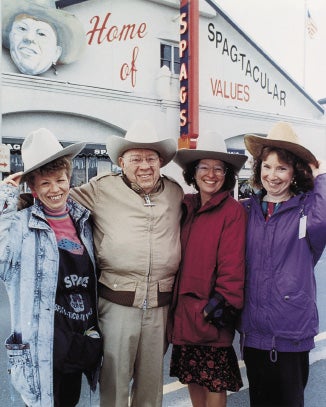
Borgatti, his daughters sold the iconic Shrewsbury discount retail destination to Building 19, which renamed the store Spag’s 19. It would become Building 19 in 2004 before closing for good in 2013. Opened as Shrewsbury Battery & Tire Service in 1934, the store didn’t accept credit cards until 1992, offer plastic shopping bags until 1996 – “No bags at Spag’s” – or shopping carts until 1998.
• Abbott ascends with approval – On New Year’s Eve day, the Food and Drug Administration announced it had approved Abbott Laboratories’ new rheumatoid arthritis drug Humira, which was developed and manufactured at the Abbott Bioresearch Center in Worcester. Now owned by Abbott spinoff AbbVie, Humira has long been among the top-selling drugs in the world.
2003
• Chamber changes – The Corridor Nine Area Chamber of Commerce dissolved its 24-year affiliation with the Worcester Regional chamber. The Westborough-based group chose to align with the 495/MetroWest Corridor Partnership, affording area business leaders “a larger voice in a region that has more common goals,” according to Corridor Nine President Nancy Carlson.
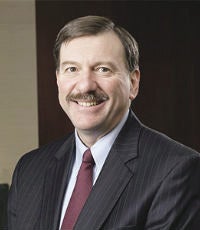
• Boss, a supernova – In an enormously consequential development for not only the company but the city of Worcester, Allmerica Property & Casualty hired Frederick H. Eppinger away from The Hartford, naming him president, CEO and director in September. As recently as the third quarter of 2001, Allmerica had reported a pre-tax operating loss of $534.5 million.
2004
• Tenet sells Saint Vincent Hospital – It might be easy to forget that Tenet Healthcare Corp. wasn’t always the owner of Saint Vincent Hospital. In October, Vanguard Healthcare Systems agreed to buy St. V’s and the Framingham and Natick campuses of MetroWest Medical Center for $126.7 million from the flagging Tenet, which was embroiled in a Medicare billing scandal. Tenet emerged from financial difficulties and acquired Vanguard in 2013 for $4.3 billion.
• Going-out-of-business sale – A decade after the Worcester Center Galleria was relaunched as the Worcester Common (Fashion) Outlets, the sprawling 32-year-old downtown mall was sold for about $30.4 million. Under pressure from then-Mayor Timothy P. Murray Cigna Investments sold the near-empty retail space and parking garage to Berkeley Investments.
2005
• Tornadoes whip up winning debut – After 71 years without a minor league baseball team, Worcester hosted a championship celebration on Sept. 15, when the Worcester Tornadoes topped the Quebec Capitales to win the Can-Am League championship in their inaugural season. The Tornadoes folded due to financial difficulties in 2012.
2006
• Bristol-Myers holds down the (former) fort – In the wake of Procter & Gamble downsizing its Devens presence, Bristol-Myers Squibb announced plans in June to build a $1.1 billion manufacturing facility at the former Army base. The 750,000-square-foot facility would sit on 80 acres and house 550 new employees.
• Sharks, thanks – About a year after the NHL’s St. Louis Blues announced they would be selling their AHL affiliate Worcester IceCats, the San Jose Sharks announced in January that they would relocate their AHL affiliate to Worcester to begin play at the DCU Center for the 2006-07 season. The Sharks stayed through the 2014 season.
• Honest to Goodness, it’s a merger – The holding companies of Hudson Savings Bank and Westborough Bank agreed to a merger in November that would create a nine-office regional bank with $995 million in assets. The new entity would be rebranded Avidia Bank.
2007
• Commerce Insurance cashes in – Webster-based Commerce Group, formerly Commerce Insurance Company, agreed to be acquired by Spain’s largest insurer, MAPFRE S.A., in a $2.21 billion cash deal. Commerce was renamed MAPFRE USA in 2010.
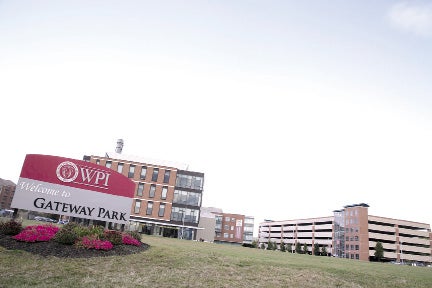
• Gateway to the future – Worcester Polytechnic Institute opened its Life Sciences and Bioengineering Center at the burgeoning 11-acre Gateway Park, a joint venture between WPI, the city and Worcester Business Development Corp.
2008
• Morgan no more – Long one of Worcester’s most prominent and profitable family-owned businesses, Morgan Construction was acquired in April by Austria-based Siemens subsidiary Siemens VAI Metal Technologies. The global leader in rolling mill technology had been owned by five generations of the Morgan family and had 1,100 employees worldwide, including 460 in Worcester.
• Genzyme expands in Framingham – Biotech and pharmaceutical giant Genzyme Corp. opened its $125 million Framingham Science Center in September, adding 350 employees to its 20-year-old MetroWest campus. The new headcount of about 2,000 made the facility Genzyme’s largest in the world. The newly enacted $1 billion Massachusetts Life Sciences Act awarded Framingham its first grant of $5.2 million to facilitate construction.
2009
• Networking event – With the proliferation of social media, area chambers of commerce and business groups organized copious social networking seminars to educate corporate leaders – though the Dec. 21, 2009, edition of WBJ said, “the jury’s still out on how widely accepted [these services] are becoming,” noting that EMC’s 3,000 Twitter followers were the most of any company in the region. Dell, with which EMC merged in 2016, has more than 820,000 followers on X in 2024.
• WBJ Milestone: Outstanding Women in Business awards debut
2010
• Massport takes a flyer on ORH – The Massachusetts Port Authority bought Worcester Regional Airport from the city in June for $15 million. Then-Lieutenant Governor Tim Murray said the state was taking an “integrated” approach to transportation. The maligned airport in recent years had been running an annual deficit of about $3 million.
• Big Tech comes to Littleton – IBM opened its largest U.S. software development lab in the North County enclave. The IBM Mass Lab, including sites in Westford, employed about 3,400 top software designers. IBM announced in 2021 that it would be closing the Littleton facility to consolidate operations in Lowell.
2011
• Corporate espionage knocks wind out of AMSC – The writing on the wall began in the spring, when Devens-based American Superconductor announced revised, and much lower, revenue figures in the wake of an earlier announcement that a Chinese customer had begun refusing wind turbine shipments. By September company founder Gregory J. Yurek retired and $186.3 million in losses were reported. Then things got worse.
For a reported $20,500 bribe, an employee of AMSC’s Austria-based subsidiary Windtec sold turbine control software to Sinovel, the Chinese customer that had contracted with AMSC for $800 million in products and services. According to evidence presented by the Department of Justice at Sinovel’s 2018 fraud trial, AMSC lost more than $1 billion in shareholder equity and almost 700 jobs. The company also lost 84 percent of its market cap for fiscal 2011.
Sinovel was found guilty in January 2018 of stealing trade secrets and wire fraud. It was sentenced in July to a $1.5 million fine and paid more than $58 million in restitution to AMSC and other victims. While AMSC never fully recovered, it reported $146 million in revenue for fiscal 2023.
2012
• TJX makes Marlborough home – TJX Cos. agreed to buy the former Fidelity Investments campus in March after Fidelity began phasing out its operation in early 2011, moving out some 1,100 employees. TJX planned to bring 1,600 employees to Marlborough. Later in the year, TJX bought its Framingham HQ for $117 million and secured tax breaks to expand both sites.
• Commerce Bank expands – In an effort to compete with larger banks, Worcester’s Commerce Bank & Trust bought Boston-based Mercantile Capital Corp. and its subsidiary Mercantile Bank & Trust Co. in March for $26,5 million.
2013
• Jabil acquires Nypro for $665M – Founded in 1955 in a converted Clinton mill, Gordon Lankton’s Nypro Inc. was acquired in July by Jabil Circuit Inc. Later in the year, the company announced the addition of about 100 jobs and an expansion to a new facility at Devens, which opened in late 2014. Jabil Healthcare consolidated Nypro in early 2020 and as of 2023 reported $34.7 billion in annual revenue.
• Central Mass. casino hopes go bust – Milford voters overwhelmingly defeated a proposal by the owners of Foxwoods Resort & Casino to develop a 200,000-square-foot casino and 500-room hotel at the November ballot box. Three months later, the state gaming commission chose Plainville over Leominster and Raynham as the final sites allowed under the state’s 2011 gaming law.
2014
• UMass Memorial loses millions, slashes jobs – The region’s largest employer and leading healthcare provider, UMass Memorial Health Care, finished its 2013 fiscal year with a $55-million operating loss. The April elimination of 103 full-time equivalent positions came on the heels of 285 job cuts from October 2013 through February.
• Cytiva moves HQ to Marlborough – Then known as GE HealthCare Life Sciences, a global leader in biopharmaceutical and life sciences technologies, Cytiva announced in August it would relocate its base of operations from New Jersey, bringing with it 500 “highly skilled” jobs, including more than 200 new positions. The 210,000-square-foot facility opened in June 2016. Cytiva was rebranded in April 2020 after Danaher Corp acquired GE for $21.4 billion.
2015
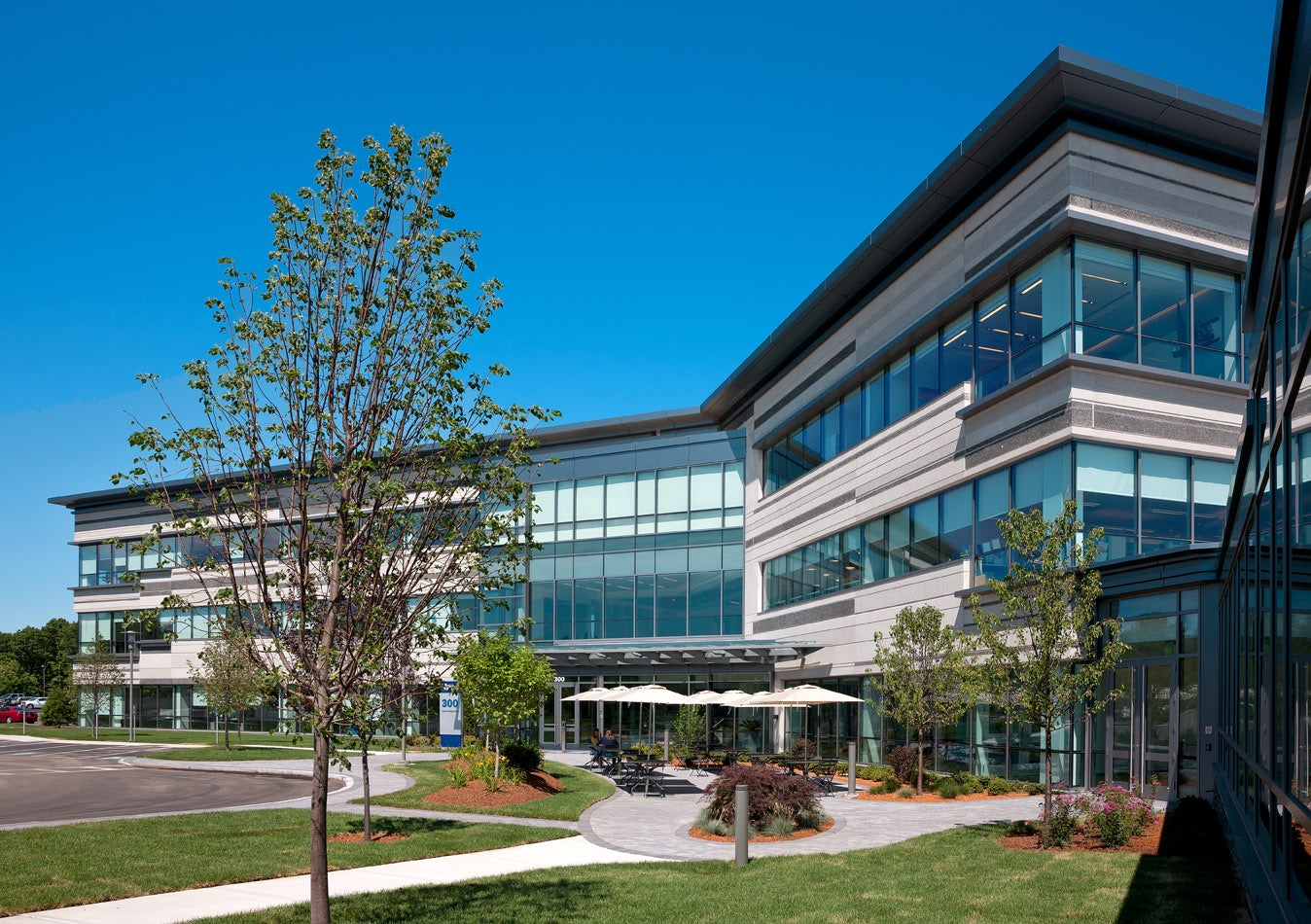
• Boston Scientific stays busy – The Marlborough-based life sciences giant agreed in March to settle a lawsuit with jilted rival Johnson & Johnson for $600 million in the wake of Boston Scientific’s acquisition of Guidant Corp. nine years earlier. Johnson & Johnson alleged Guidant broke a merger deal with them and had sought $7.2 billion in damages. BSX bought Guidant in 2006 for $27.2 billion.
Later that month – riding high from a surge in its stock price – Boston Scientific made its largest acquisition since … 2006 when it purchased Guidant. In a $1.6 billion cash deal BSX bought the urology division of American Medical Systems.
2016
• SWIP sells out – After more than two decades of fits and starts, South Worcester Industrial Park sold its final parcel to Chacharone Properties for $65,000. Chacharone, which planned a 7,500-square-foot manufacturing facility at 26 Southgate St., already had skin in the game after agreeing to develop a 50,000-square-foot facility for Table Talk Pies.
• Banking on synergy – Marlborough Savings Bank and North Middlesex Savings Bank agreed to a merger creating a mutual bank with nearly $1 billion in assets and 14 regional branches. The banks were rebranded Main Street Bank in February and the merger was finalized in April.
• WBJ Milestone: Print edition redesign featuring current WBJ flag
2017
• Groundbreaking development – Insulet, an insulin pump maker, broke ground on a $100-million, 350,000-square-foot manufacturing facility and company headquarters in October in Acton. Insulet, previously based in China, purchased the 26-acre property in February for $9.25 million.
• New life for Spag’s site – Where Spag’s once stood, a new generation of shopping center, the mixed-use development, took its place. Lakeway Commons held a grand opening in October. The 375,000-square-foot development would be anchored by Whole Foods grocery store and feature a bank, a coffee shop, 250 apartments, 14 townhouses – and a memorial sculpture honoring the Spag’s legacy.
2018
• City Woos the Sox – In a seismic development for Worcester’s Canal District and downtown, city leaders joined Pawtucket Red Sox officials in August to announce the Red Sox’ top minor league affiliate would move to the long-vacant Wyman-Gordon property at Madison and Washington streets. The stadium would debut in May 2021 as Polar Park and ultimately cost $159 million, including $41 million for land-taking.
• Green banking solution – Gardner-based GFA Federal Credit Union made a name for itself in September when it became the first bank to service the state’s nascent legal marijuana industry. GFA partnered with Safe Harbor Services of Colorado, a financial services firm specializing in the cannabis business.
2019
• Living and dying – After 49 years as a quintessential grocery destination in Worcester, the venerable Living Earth Natural Market & Cafe announced it would close at year’s end. Long before it was trendy, Living Earth sold organic, locally sourced, farm-to-table products. The popular market was owned and operated by its founders Albert and Magdalena Maykel since its 1971 founding.
2020
• A pandemic positive – As COVID-19 was upending life as we know it, a slew of innovations became part of the “new normal.” Some, like telehealth, were here to stay. Reliant Medical Group had not yet begun the practice before January, but instituted virtual appointments within days. By May, UMass Memorial Medical Center had conducted up to 25,000 telehealth appointments a month.
Easy does it – Framingham office retailer Staples sold its longtime headquarters in February for $165 million to a New York firm specializing in sale-leaseback deals. LCN Capital Partners added the 907,000-square-foot building to its portfolio of more than 200 properties comprising more than 24 million square feet of space.
2021
• What’s in a name? $175M – UMass Medical School announced it had received a $175 million donation from The Morningside Foundation, whose founders, the Chan family, had launched the venture capital and private equity firm in 1986. The gift, to be paid over five years, added $35 million annually to the school’s $200 million endowment; it also changed the school’s name to UMass Chan Medical School.
• Ladies’ first – Marlborough-based St. Mary’s Credit Union named Larissa Thurston president and CEO in October to replace retiring CEO James Garvey. Thurston, formerly chief operating and financial officer, was the first woman to lead the institution since its 1913 founding.
2022
• Bold Sturbridge vision – The owner of 12 convenience stores and gas stations in Connecticut announced plans to build a $17.5 million electric vehicle discovery center and travel stop at the site of a former truck stop in Sturbridge. Michael Frisbie said the 16,000-square-foot building would include a convention center, electric vehicle showroom and driving range, charging station, and gas station.
2023

• Canna-biz! – Massachusetts adult-use marijuana gross sales passed the $5-billion milestone in August, according to the Worcester-based Cannabis Control Commission. Recreational sales had hit the $4 billion mark in January. The CCC said the eight-month period between sales benchmarks was the fastest Mass. marijuana sales had generated $1 billion.
• Diamond in the rough – Only four months before principal owner Larry Lucchino died, the Worcester Red Sox were acquired by Diamond Baseball Holdings, a subsidiary of private equity giant Silver Lake, which owns and operates 36 minor league teams. Ralph Crowley Jr. and Jim Skeffington Jr. were retained as local ownership, with DBH purchasing a majority of shares.
2024
• From Russia, with love – IPG Photonics, founded in Moscow in 1990 and now the third-largest manufacturer in Central Mass., sold its Russian subsidiary IRE-Polus In August for $51 million. The company, based in Marlborough and Oxford, referenced the impact of sanctions on trade initiated after the start of the Russian war with Ukraine, as it marked its exit from the country after 34 years.
– Compiled by Fred Hurlbrink Jr.
